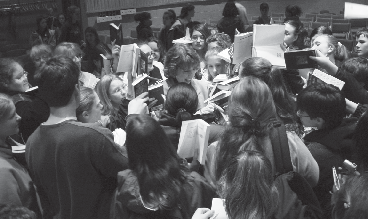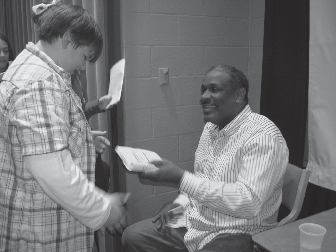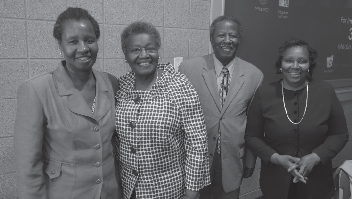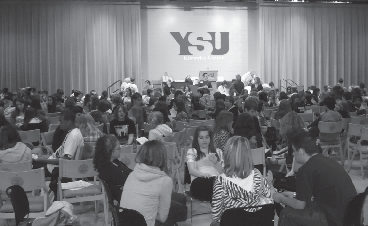ALAN v38n3 - Outside the Classroom: Celebrating YA Lit at the English Festival
Outside the Classroom:
Celebrating YA Lit at the English Festival
In the 1976 Coda to her seminal work Literature as Exploration , Louise Rosenblatt characterizes effective literature study with a metaphor:
In the teaching of literature, then, we are basically helping our students to learn to perform in response to a text. In this respect we are perhaps closer to the voice teacher, even the swimming coach, than we are to the teacher of history or botany. The reader performs the poem or the novel, as the violinist performs the sonata. But the instrument on which the reader plays, and from which he evokes the work, is—himself. (p. 279)
I’ve often thought of that performance metaphor during my 30-plus-year love affair with a program sponsored by my university, the Youngstown English Festival. The English Festival is a program to encourage and reward reading and writing among young people in grades 7 through 12, and it uses young adult literature as an anchor for the experience. That the Festival emerged from a university English department (that “ivory tower” of literary history and criticism) is remarkable. That it has survived, even thrived, for more than three decades defies all logic, for it is a profoundly challenging program to pull off each year, requiring thousands of dollars in grants and contributions, hundreds of volunteers, and untold hours of planning and effort from an organizing committee that, to put it bluntly, has no common sense about a proper investment of time and energy. By all measures, the Festival should have been buried by its own demands decades ago. That it hasn’t speaks to the opportunities it presents for young readers and writers, and for the intangible rewards it provides for everyone involved in the experience—young readers, area teachers, university professors, and the community itself.
This issue of The ALAN Review is shaped by the theme “What Does YA Literature Look Like in Spaces Other than the Classroom?” The YSU English Festival provides a case study answer to that question.
The YSU Festival
What is this program called the English Festival? Founded in 1978, the Youngstown State English Festival is an annual celebration of reading and writing. Students are invited to the Festival in the fall through their schools (approximately 175 middle and high schools in our region of Northeast Ohio and Western Pennsylvania participate each year); to attend, they must read seven books on a preapproved booklist. While there is no stipulation that these titles be YA, most of them are. The book selection policy reveals the program’s intentions:
The aims are to encourage students to read more, thereby improving all of their communication skills; to enhance their interest and enjoyment in reading, thereby building pleasurable and positive associations with reading as an activity; to indicate to students that “literature” is not merely an academic course but can and should be an integral part of their lives; to introduce students to authors and works of sufficient caliber to lead students to a recognition of and respect for writing of high quality; and to develop a lifelong taste for works of superior literary quality. ( Youngstown State University English Festival Information Brochure , p. 22 )
Once enrolled through their schools, students spend the fall and early winter reading the titles on the Festival list. As spring approaches, teachers do an informal check (through writing assignments, quizzes, or conversations) to verify that students have read the Festival books and are prepared for the event. This relatively simple step is important for several reasons. First, it sends a message to students that the English Festival is asking something from them. This is not a free day from school but rather an alternative educational experience, and for it to be successful, students must have prepared themselves through reading. Second, because the English Festival is an immensely successful program, we have had to limit the number of students attending from each school. The message for students is that Festival participation is a privilege, and if they do not read to prepare themselves, there are other students ready to take their place who are prepared.
Students are also invited to participate in pre-Festival competitions. These include the Candace Gay Memorial Essay Contest, a writing competition that invites response to the books; an art contest in which students create original works that would be suitable for cover or promotional art for a book on the reading list; and the Jeremy Salvner Memorial Music Contest, in which students compose original music inspired by a character or event in one of the stories.
The English Festival itself occurs in April. Because of its scale, it takes three consecutive days to complete, with nearly 3,000 attendees annually. Senior high students (grades 10–12) attend on Wednesday, and different groups of junior high/middle school students (grades 7–9) attend on Thursday and Friday. Despite public claims that student interest in reading and academics drops off precipitously in middle school, we reserve two full days for these students because response is so great at this level. Hundreds of students are turned away each year, the largest portion of them in grades 7 through 9.

Joan Bauer at the festival in 2004
The English Festival itself is a juggernaut. Students arrive at our student center around nine, are welcomed to campus, and are quickly sent off to their first sessions. The day is divided into five periods and, through a tracking system, students attend a variety of workshops, discussions, and competitions. These include impromptu writing contests (in which they respond to topics about the Festival books); writing game competitions (in which they collaborate with students from other schools on fanciful writing tasks); poetry and prose workshops; “renga riot” poetry-writing contests; “not-so-trivial-pursuit” contests, challenging students to recall essential details from the books; “insight” sessions, which make use of university faculty or community volunteers to lead book discussions; journalism workshops, during which student journalists interview authors or others associated with book topics; writing labs, which are noncompetitive collaborative writing workshops used to enhance students’ awareness of the elements and pleasures of writing successfully; presentations featuring the winning entries in the art and music competitions; talks by young adult literature experts or librarians about recommended YA authors and titles; presentations by university faculty from other disciplines whose expertise relates to book topics (e.g., biology faculty to explicate the science in John Fleischman’s Phineas Gage: A Gruesome but True Story about Brain Science [ 2002 ] or art faculty to provide additional context for Sandra Jordan and Jan Greenberg’s Vincent Van Gogh: Portrait of an Artist [ 2001 ]); and, finally (and very important), presentations by at least one young adult author whose books are represented on the reading list.

Christopher Paul Curtis in 2008
We’ve been bringing YA authors to campus for 30 years, and we are at the point where the Festival would probably not survive without them, so vital are they to students’ expectations. As anyone who has sponsored an “author day” at school can attest, most young readers normally see writers as removed from them (and often, sadly, dead). Allowing students to hear a writer talk about how a book is crafted—particularly a book that they have read—increases their understanding of what writing is, how stories are made, and what authors draw upon as the basis for their books. Over the years, we’ve hosted a stellar cast of YA authors, including Richard Peck, M. E. Kerr, Robert Cormier, Chris Crutcher, Naomi Shihab Nye, Bruce Brooks, Sue Ellen Bridges, Joan Bauer, Jacqueline Woodson, Christopher Paul Curtis, Paul Zindel, Will Hobbs, William Sleator, Cynthia Voigt, Joseph Bruchac, Graham Salisbury, Paul Janeczko, Suzanne Fisher Staples, Harry Mazer, Norma Fox Mazer, Sharon Dennis Wyeth, Virginia Euwer Wolff, and Jennifer Armstrong. Each year, we sponsor at least one author, and in some special anniversary years, we’ve sponsored as many as five. (For a complete list of authors and further information about the English Festival, visit its website: www.ysuenglishfestival.org .)
We bring other guests to campus, also, to enrich the reading/writing experience for students. These include academics (e.g., Alleen Pace Nilsen, Ken Donelson, Jim Blasingame), librarians (e.g., Nancy Pearl), and musicians and performers (e.g., Poetry Alive! and blues guitarist Guy Davis). Twice we’ve hosted the children of Reverend Fred Shuttlesworth, whose childhood involvement in the Civil Rights Movement was featured in Ellen Levine’s Freedom’s Children ( 1993 ). In a sense, this was like having characters from a book present, and students were moved by their stories of the equal rights struggle, as well as by their passion and decency.

The Shuttlesworth children
Each Festival day ends in an awards ceremony in which student readers and writers are recognized for their accomplishments. It has been a longstanding intention of the Festival to recognize many students at this event, not just a select few. So, for example, there are 30 honorable mention prizes in the impromptu writing contest and multiple teams of students who win in writing games. In all, more than 200 students march to the stage each Festival afternoon to receive books, merchandise, and cash awards that total more than $20,000 annually. And the students in the audience? They cross their fingers for their names to be called, and they cheer, stomp, do the wave, and otherwise go a little nuts each time someone from their school comes forward. Robert Cormier, who visited the Festival twice, likened the awards ceremony to a pep rally and was ecstatic to see young readers and writers, instead of athletes, being acclaimed by their peers for their accomplishments.
So that’s a snapshot of the Youngtown English Festival, but it’s not yet a full answer to the question, “What does YA literature look like in spaces other than the classroom?” For that, a bit more context is needed.
The Pleasure of Reading outside of the Classroom
In his provocative book about young people and reading, Better than Life ( 1999 ), Daniel Pennac tells the story of a young boy who, first captured by the magic, the “alchemy” of reading, somehow loses that magic, that pleasure, as he proceeds to school and into adolescence. Pennac is an equal-opportunity scold about how this happens, placing responsibility for the loss of reading joy and competence upon parents, schools, and a culture of immediate, nonprint fixations. “How did books become objects?” he asks. “A curious metamorphosis: magic working backwards toward banality” (p. 58). Referring to parents’ roles in the reading development of this young person, he notes, “First, we were his storyteller. Later, we became his accountant” (p. 59).
In discussing the role of schools in this transformation of a young, curious reader into a nonreader, Pennac notes what often happens when teachers replace the experience of reading itself with external expectations about reading:
Those of us who read and say we want to spread the love of reading, much of the time we’d rather be commentators, interpreters, analysts, critics, biographers, exegetes of works silenced by our pious respect for their greatness. Imprisoned in the fortress of our expertise, the language of books is replaced by our own language. Instead of letting the intelligence of stories speak through us, we turn to our own intelligence and talk for the stories. We have stopped being the messengers of literature, and turned into the fervent guardians of a temple whose miracles we praise with the very words that close its doors. You must read! You must read! (p. 112).
Let me categorically say at this point that, whatever Pennac’s point here, mine is not to blatantly indict teachers as a primary cause of students’ loss of reading pleasure. Certainly some understand and are committed to transferring the love of reading more than others, but regardless of dedication and passion, these teachers are like Sisyphus, endlessly rolling the reading boulder up the hill and having it rumble back down, often through no fault of their own.
In another essay about literature teaching in schools, I’ve observed what many others have noted long before me—that the very structures within schools, even their very goals, inflict this damage on the love of reading:
“One of the problems that plague many literature classes is that of authority, in which students see themselves as subservient to, and controlled by, both the text being read and the teacher who chooses the text and directs the reading” ( Salvner, 2000, p. 94 ).
Grades do this, and so do state assessments and accountability measures that reduce literature to a process of reading for facts (e.g., Who is Dimmesdale in Nathaniel Hawthorne’s The Scarlet Letter ?), for inference (e.g., What is the scarlet letter symbolic of?), even for cultural knowledge (e.g., What does The Scarlet Letter reveal about Puritanism?).
Another impediment to reading pleasure can sometimes be the literature itself. In other words, literary works sometimes carry their own authority. Consider the weight of the label “classic” upon reading. The implication of the title is that others have ascribed greatness to the work, have labeled it as “timeless” or “important” or “profound.” Reading under those circumstances is pressured by expectation, responsibility, and accountability not only to the text, but also to the traditions of literature.
There is no escaping this authority on some level. Virginia Monseau alludes to it in her article on student response, “Seeing Ourselves in the Mirror: Students and Teachers as a Community of Readers” ( 2000 ), in which she makes use of Walker Gibson’s distinction between the “real” reader engaging a text and a “mock” reader “whose mask and costume the individual takes on in order to experience the language” (p. 79). All readers, in other words, are compelled to accept constraints set up by the author of the work. All readers are invited into a story through an interesting narrator, a compelling situation, and carefully chosen language; those who accept the invitation have access to the rewards of the experience, while those who cannot, or will not, engage the experience will conclude that the book is “not for them” or, to put it more crassly, is “not a good book.” This is another characterization of authority. A book sets up premises, expectations, and demands for a reader; the reader chooses to play along, or not.
Enter young adult literature and a lesson of the English Festival. One of our Festival aims is “to help students become lifelong readers,” and such development hangs partly on employing a collection of works that “invite a student in”—that, in other words, allow a student with authority over, or experience with, what it means to be young, to bring that experience to his or her reading and become a “mock reader” who believes in, and thus accepts, the premises of the book.
One of the activities of the English Festival is an “Insight Session,” which is really nothing more than some form of literature discussion. Insights may not be appreciably different from what teachers attempt day after day in their classrooms, but we’ve been impressed by how many teachers conducting these sessions at the Festival report that something here seems different, that Festival sessions are engaging, lively, boisterous even, while their correlates in schools are appreciably less so.
One reason has already been stated—that the Festival is not adorned or weighted with the authority of grades, homework, coercion. Students come willingly to our event, and they enter our sessions with a mindset more exploratory and adventurous than obedient and cautious.
Battle for the Books
But the other factor has to be the works themselves. As anyone knows who has watched young readers read YA books, adolescents feel a confidence about reading these works, not only because they may be streamlined and less adorned with plot complexities and an overabundance of characters, but also because these books are, in some way, about themselves. These are their stories, and while they may not have experienced everything in a particular book, they do understand the adolescent questioning (and sometimes angst) that drives the plot forward. They have authority over YA books because they understand their premises.
For more than 30 years, we’ve observed young people flood to our English Festival with excitement and anticipation, and we’ve kept the Festival alive only because we can’t possibly imagine cutting off that energy if students keep bringing it. This is the excitement over reading and writing that sustains all teachers, and it has brought us closer to those who toil in the classrooms within our region.
The YSU English Festival has also gotten us in trouble on occasion, for the same reason that teachers who use lively and honest books also get into trouble—censorship. Over the years, some parents, teachers, and school administrators have occasionally objected to books on our reading list that contain offensive language, references to sex, controversial topics, and challenges to authority. One epic battle, in 1997, was over our inclusion of the book Letters from the Inside ( 1991 ) by John Marsden; that battle mobilized large parts of the community, including the Catholic Diocese of Youngstown, radio talk hosts, local newspapers, and many school officials. (For a full report on that battle, see my 1998 article “A War of Words: Lessons from a Censorship Case.” )

Students engaged in a writing activity
We don’t look for controversy by deliberately choosing books that will provoke an angry response, but, in a sense, the English Festival is a good place for addressing these censorship issues that swirl around young adult literature. Because ours is a volunteer activity and no students are required to attend, parents or young people may simply opt out of the event in a particular year if a selected book is unsettling to them. (This has not stopped objections, however. Some parents complain that their children are being deprived of this wonderful experience because we are using books they don’t like, but we can address those concerns much more easily than can a teacher who is requiring a book for a course unit or lesson.)
During the Letters from the Inside controversy, we turned the battle over this book toward a positive end. At the Festival, we discussed with students what censorship is and what some see as “offensive” subject matter in books. We also sponsored public sessions in which we invited teachers, librarians, and community members to engage the same questions. In that way, we were contributing to an essential community conversation—about young adult books and their content, about literature in general, about how stories might challenge readers, and about what “truth” is in literature. (I’ve frequently heard from complaining administrators or parents, “With all the good books out there, why did you have to choose that one?”—a perfect opening for conversation about what “good” literature is and what we expect stories to do.)
Conclusion
Young adult literature has an important role to play in the English classroom, providing as it does compelling reading experiences that young people engage in and respond to. YA lit belongs outside the classroom also, however, and the YSU English Festival offers one test case of its potential there. Establishing an environment where reading and writing are celebrated rather than tested fulfills the promise for literature that Louise Rosenblatt characterized thus:
The literary work is not primarily a document in the history of language or society. It is not simply a mirror of, or a report on, life. It is not a homily setting forth moral or philosophic or religious precepts. As a work of art, it offers a special kind of experience. It is a mode of living. The poem, the play, the story, is thus an extension, an amplification, of life itself. The reader’s primary purpose is to add this kind of experience to the other kinds of desirable experience that life may offer. (p. 278)
The YSU English Festival recreates this experiential dynamic for literature, and it places YA lit at center stage in this enterprise. Teachers in area schools, we know, understand the transformative value of literature as exploration, but we also understand the constraints placed upon schools that distort authentic interactions with books. Those of us allied with the English Festival see ourselves as partnered with teachers in the effort to share the gift of reading with young people. At the Festival, individual readers engage texts personally and express their views in discussion sessions, writing, art, and music. At the Festival, young readers form communities to collaborate in response to books, discovering the pleasure of a shared literary experience. At the Festival, YA books stand at the center, and students, authors, teachers, university faculty, and community members gather around them and applaud.
Gary Salvner is a past executive secretary and past president of ALAN. A former elementary and secondary teacher, he is professor and chair of the Department of English, Youngstown State University, Youngstown, OH, where he teaches courses in children’s and young adult literature and English education.
References
Fleischman, J. (2002). Phineas Gage: A gruesome but true story about brain science. Boston: Houghton Mifflin.
Greenberg, J., & Jordan, S. (2001). Vincent Van Gogh: Portrait of an artist. New York: Dell Yearling.
Hawthorne, N. (2004). The scarlet letter (4th ed.) New York: W. W. Norton. Originally published 1850.
Levine, E. (1993). Freedom’s children. New York: Puffin Books.
Marsden, J. (1991). Letters from the inside . New York: Dell.
Monseau, V. (2000). Seeing ourselves in the mirror: Students and teachers as a community of readers. In V. Monseau & G. Salvner (Eds.), Reading their world: The young adult novel in the classroom (pp. 68–84). Portsmouth, NH: Heinemann/Boynton-Cook.
Pennac, D. (1999). Better than life. York, ME: Stenhouse.
Rosenblatt, L. (1976). Literature as exploration (3rd ed.) New York: Noble and Noble.
Salvner, G. (1998). A war of words: Lessons from a censorship case. The ALAN Review, 25 (2), 45–49 .
Salvner, G. (2000). Time and tradition: Transforming the secondary English class with young adult novels. In V. Monseau & G. Salvner (Eds.), Reading their worlds: The young adult novel in the classroom (pp. 85–99). Portsmouth, NH: Heinemann/Boynton-Cook.
Youngstown State University English Festival information brochure. (2010). Youngstown, OH: Youngstown State University.